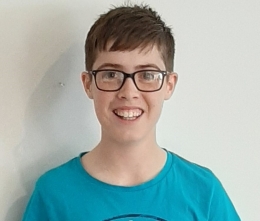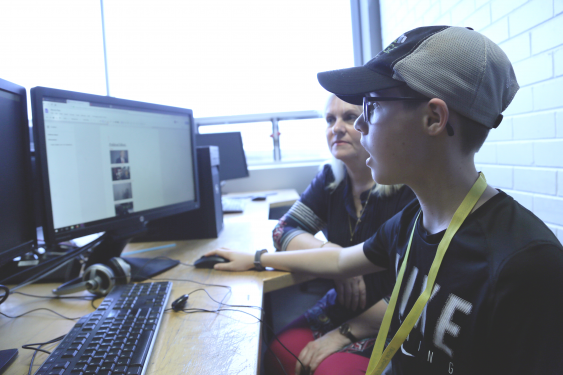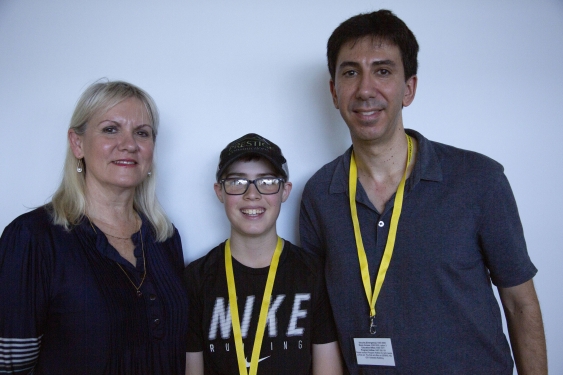Hundreds of gifted children flock to UNSW campus
UNSW opens its doors to children across Australia as part of its GERRIC workshops to prevent gifted underachievers becoming lost in the school system.
UNSW opens its doors to children across Australia as part of its GERRIC workshops to prevent gifted underachievers becoming lost in the school system.

Rachel Gray
UNSW Media & Content
+61 (02) 9385 0445
rachel.gray1@unsw.edu.au
Archie loves to read and has just started Ranger’s Apprentice, a series of teenage medieval fantasy books by Australian author John Flanagan.
The 12-year-old from the outback NSW town of Dubbo has an aptitude for the written word and recently won $50 in a poetry writing contest at the local RSL.
“I enjoy English, poetry, story writing and reading,” Archie says.
But when asked what he wants to be when he grows up, the precocious kid is quick to say “a cricket player.”
“It‘d be my dream to play cricket for Australia,” he says.
“And when I retire, or if I get dropped from the team, if I do end up playing, then I’d like to either be a policeman or an international pilot."

Gifted child Archie Gough
Archie is one of 335 children from across Australia who attended UNSW’s unique and highly specialised GERRIC Student Programs for gifted children last month.
GERRIC holds exclusive three-day programs in January and July for kids from years three to 10 at UNSW’s Kensington campus in Sydney.
It’s a place where kids who outperform in the top 10 per cent for their age group get to learn everything from history, to the arts, mathematics, technology, communication skills, music and more.
This year, Archie has been enrolled in the Spatial Storytelling workshop, taught by UNSW lecturer Dean Utian.
The workshop explores the deeper meaning of architecture and spaces in films, and students get to make their own short video as a result.
Mr Utian, who has nurtured gifted kids at GERRIC for 20 years, says Archie and his newfound friend, Manuel, paired-up to make a two-minute satirical political news report.
“Archie is a sweet student, very motivated, focused, self-directed, engaged and enthusiastic,” Mr Utian says.
It is these traits that often characterise gifted kids, he says. “They can pick up on things very quickly, you can introduce something and they’ll take it a lot further without much direction.”
Archie says he has had fun making the video using editing suite Premiere Pro, a skill which he is excited about developing when he returns to school in Dubbo.
“For the news, we’ve covered Donald Trump and his impeachment, climate change, the Hong Kong protests and the unsocial balance in society,” Archie says of his collaborative effort with his classmate.
“We’ve also got a green screen and this dude is sitting in a car and he’s looking out a window where we’ve put Greta Thunberg saying; “how dare you?”
Archie’s grandmother says her grandson began spelling his own name before his first birthday. But, she says, his giftedness has only been identified in the last 12 months or so.
“So before that,” she says, looking adoringly at her grandson sitting beside her, “Arch was having lots of different difficulties at school in some of his social interactions.”
“And he’s a bit of a gifted underachiever,” she says of her grandson who also has Autism Spectrum Disorder.
GERRIC Director, Associate Professor Jae Jung, says that teaching needs to be appropriately pitched to the specific needs of gifted students.
“Typically, this will mean that the teaching needs to be at a faster pace and needs to cover material that is at a greater level of complexity and depth,” A/Prof Jae Jung says.

Archie beside his grandma at UNSW GERRIC in Sydney (photo: Rachel Gray)
And UNSW is one of only three universities in Australia that specialise in gifted education as a compulsory part of teacher training programs.
UNSW student Rachel Wilton assisted during the January workshops and is on her way to completing the Responding to Gifted and Talented Students course as part of her teaching degree.
She says being able to identify students who are gifted but are underachieving is a really important skill to prevent them from falling behind in the school system.
“Some of the students grew bored and became distracting to other students if their minds weren't being stimulated enough,” she says of the GERRIC workshop she assisted with.
“What I had learnt in theory certainly informed how I prepared, managed behaviour, spoke and explained instructions in the classroom.”
Children who attend the GERRIC workshops are often from humble backgrounds and not identified as gifted because of expensive out-of-school tutoring.
And many children from low-income households go unrecognised as gifted because the specialised IQ test costs a pocket-draining $1000.
Archie is the eldest of four and his parents are struggling to maintain their family business during the drought.
“The river,” Archie says. “Dad and I used to go fishing heaps but we haven’t fished for over a year now because there is no fish in the river. Huge algae has started to grow.”
With all this going on in his hometown, the boy from outback Dubbo was even more heartbroken to hear he missed out on one of only very few scholarships on offer.
Thankfully, when teachers attending the monthly Gifted Education workshops heard about Archie’s story, they snapped into action by pitching in five, 10 or 20 dollars each.
It was just enough to pay for him to attend the Spatial Storytelling workshop.

Archie stands between his grandmother and UNSW GERRIC teacher Dean Utian
Archie says he is a “really big fan” of GERRIC and it has given him something to look forward to as he envisions life at UNSW after highschool.
“Dean is a really good teacher,” he says.
“And I love the atmosphere - it’s really good the way kids respect teachers, and teachers respect kids.”
Archie’s grandmother says he “finds his people” at GERRIC because he receives the stimulation he craves.
“It’s almost like you can see his head expand,” she says. “The first night he couldn’t get to sleep because he was thinking about what he was going to do tomorrow.”